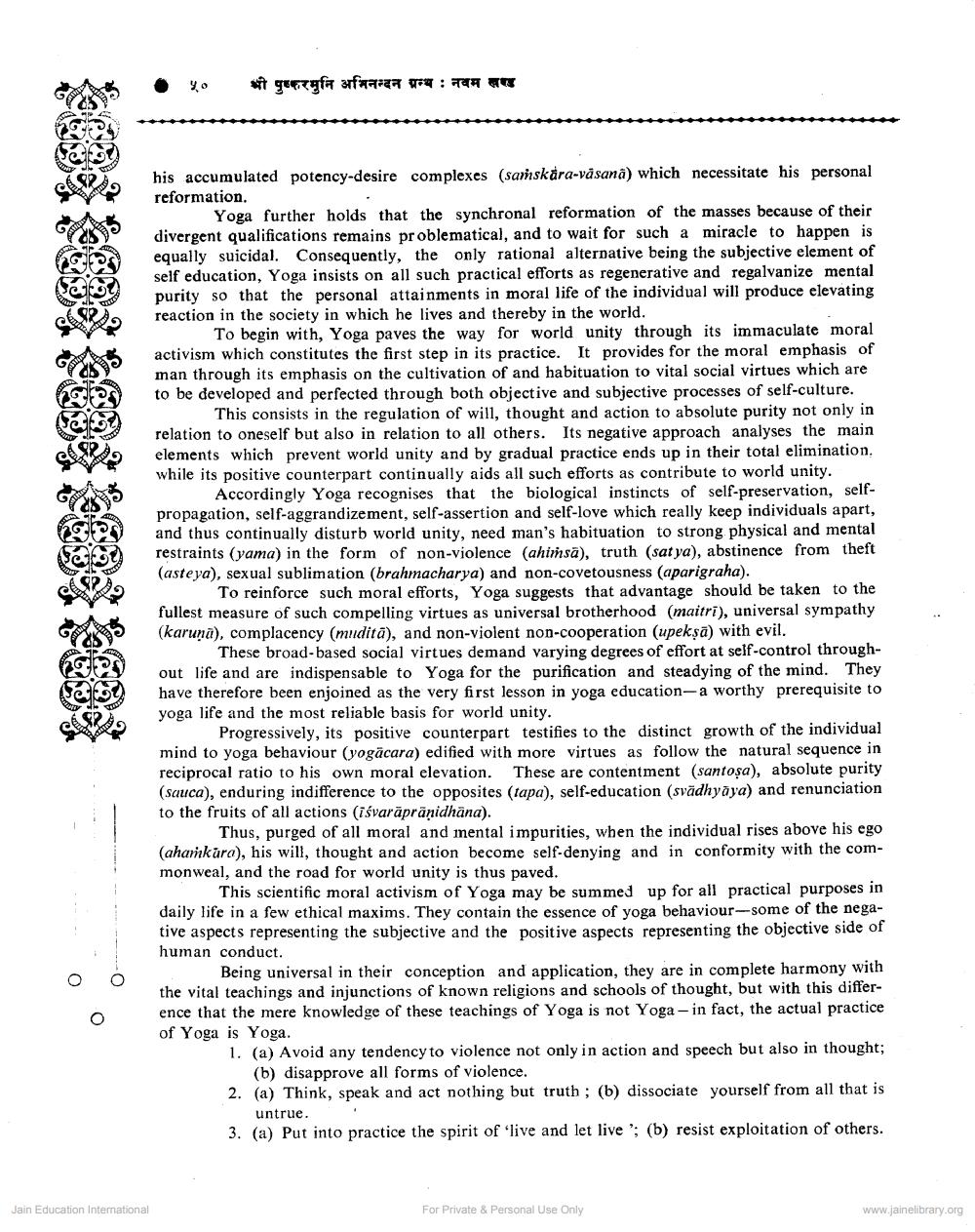________________
५०
भी पुष्करमुनि अभिनन्दन ग्रन्थ : नवम खण्ड
his accumulated potency-desire complexes (saṁskara-vasana) which necessitate his personal reformation.
Yoga further holds that the synchronal reformation of the masses because of their divergent qualifications remains problematical, and to wait for such a miracle to happen is equally suicidal. Consequently, the only rational alternative being the subjective element of self education, Yoga insists on all such practical efforts as regenerative and regalvanize mental purity so that the personal attainments in moral life of the individual will produce elevating reaction in the society in which he lives and thereby in the world.
To begin with, Yoga paves the way for world unity through its immaculate moral activism which constitutes the first step in its practice. It provides for the moral emphasis of man through its emphasis on the cultivation of and habituation to vital social virtues which are to be developed and perfected through both objective and subjective processes of self-culture.
This consists in the regulation of will, thought and action to absolute purity not only in relation to oneself but also in relation to all others. Its negative approach analyses the main elements which prevent world unity and by gradual practice ends up in their total elimination, while its positive counterpart continually aids all such efforts as contribute to world unity.
Accordingly Yoga recognises that the biological instincts of self-preservation, selfpropagation, self-aggrandizement, self-assertion and self-love which really keep individuals apart, and thus continually disturb world unity, need man's habituation to strong physical and mental restraints (yama) in the form of non-violence (ahiṁsā), truth (sat ya), abstinence from theft (asteya), sexual sublimation (brahmacharya) and non-covetousness (aparigraha).
To reinforce such moral efforts, Yoga suggests that advantage should be taken to the fullest measure of such compelling virtues as universal brotherhood (maitri), universal sympathy (karunā), complacency (mudita), and non-violent non-cooperation (upekṣā) with evil.
These broad-based social virtues demand varying degrees of effort at self-control throughout life and are indispensable to Yoga for the purification and steadying of the mind. They have therefore been enjoined as the very first lesson in yoga education- a worthy prerequisite to yoga life and the most reliable basis for world unity.
Progressively, its positive counterpart testifies to the distinct growth of the individual mind to yoga behaviour (yogacara) edified with more virtues as follow the natural sequence in reciprocal ratio to his own moral elevation. These are contentment (santoșa), absolute purity (sauca), enduring indifference to the opposites (tapa), self-education (svädhyāya) and renunciation to the fruits of all actions (iśvaräpränidhāna).
Thus, purged of all moral and mental impurities, when the individual rises above his ego (ahankara), his will, thought and action become self-denying and in conformity with the commonweal, and the road for world unity is thus paved.
This scientific moral activism of Yoga may be summed up for all practical purposes in daily life in a few ethical maxims. They contain the essence of yoga behaviour-some of the negative aspects representing the subjective and the positive aspects representing the objective side of human conduct.
Being universal in their conception and application, they are in complete harmony with the vital teachings and injunctions of known religions and schools of thought, but with this difference that the mere knowledge of these teachings of Yoga is not Yoga-in fact, the actual practice of Yoga is Yoga.
1. (a) Avoid any tendency to violence not only in action and speech but also in thought;
(b) disapprove all forms of violence. 2. (a) Think, speak and act nothing but truth; (b) dissociate yourself from all that is
untrue. 3. (a) Put into practice the spirit of 'live and let live '; (b) resist exploitation of others.
--
Jain Education International
For Private & Personal Use Only
www.jainelibrary.org




